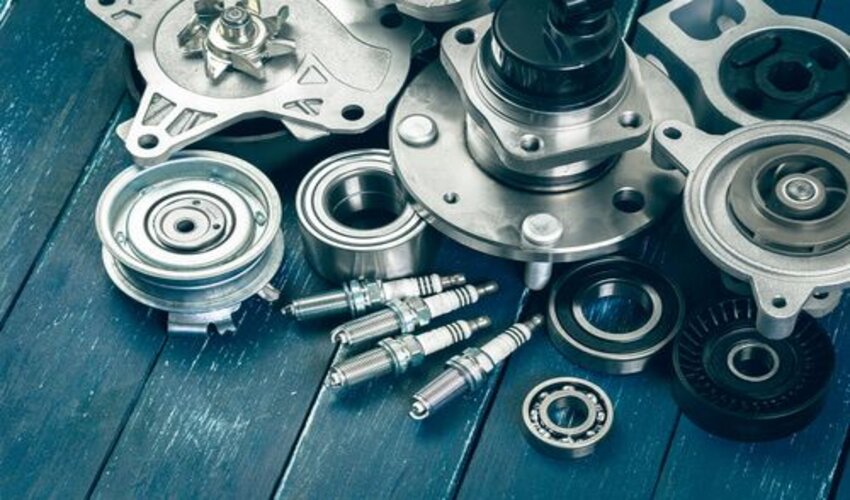The Indian auto parts industry is huge, and the demand for the components is increasing at a rapid pace. This sector encompasses manufacturers, suppliers, and distributors involved in the production of automotive components. Plus, this industry supplies auto parts to diverse sectors, including supplier vehicles, commercial vehicles, two-wheelers, and tractors. According to the Automotive Component Manufacturers Association of India (ACMA), total industry turnover would rise by 10-15% in FY 2024.
The bright future of the automotive parts industry depends on emerging technologies. Manufacturers and distributors have begun to adopt these technologies into their business processes to achieve growth and increased profits. This evolution of technology never stops. These technologies offer the potential for increased efficiency, customization, and cost-effectiveness in the manufacturing of automotive parts. Plus, they have this transformative power for a dynamic and innovative future. In this blog, explore the different types of trends and technologies that are influencing the automotive parts manufacturing industry.
Automotive parts Industry Trends in 2023
- Self-driving cars
Self-driving car’s origins can be traced back to the time when improvements were made to smart cruise control systems and self-parking features. And it went through reliable, constant change to become a more efficient and reliable technology now.
- In-car Internet
In-car internet in cars? Today’s technology is so advanced that vehicle manufacturers have teamed up with the telecom industry to manufacture new models of cars with in-house internet. For up to five connected devices, internet speeds are on par with 4G LTE, ensuring similar performance and connectivity.
- Digitally buying cars
Digitalization is a big boon for the customers of the auto parts industry. Car dealership negotiations have traditionally been a less enjoyable experience for consumers. However, the advent of the digital transformation era is revolutionizing this process. Online car marketplaces now offer the convenience of completing the entire purchase online, including digital credit applications, online notarization, and underwriting, all consolidated in a single platform.
- Electrical vehicles(EVs)
The demand for electric vehicles emerged due to the prevailing environmental issues. Manufacturers are currently solving the issues pertaining to high prices, battery life and charging infrastructure. Several start-ups have originated to develop tech solutions for broader EV adoption.
- Shared mobility
The collective utilization of a vehicle by commuters, without individual ownership, is shared mobility. The development of ride-sharing apps is revolutionizing the automotive industry. There are these bike-sharing apps and ride-sharing apps popularizing this trend. This shared mobility has enabled people to obtain transportation at affordable rates. Young people are more into this car pooling and are quite subscribed to it.
- Augmented reality
Augmented Reality (AR) can offer valuable insights into the appearance and performance of a car under various conditions, enhancing our understanding and visualization of its capabilities.
Trends influencing the automotive parts industry
Here are some of the technological innovations shaping the automotive parts manufacturing industry.
- AI(Artificial Intelligence) and ML(Machine learning)
AI and machine learning are a game changer for the auto parts manufacturing industry. In this age of extreme digitalisation, robots are collaboratively working in the assembly lines with humans. Their algorithms are set to identify defects or irregularities in the system to maintain quality and safety.
- Human-machine interfaces
When thinking of human-machine interfaces the first thing that comes to our mind is voice assistant technology. But voice assistant technology and haptic technology are used to operate vehicles, especially self-driving cars. This will make driving enjoyable and safer.
- Blockchain technology
Blockchain is majorly beneficial for the supply chain system. It ensures that the raw materials and spare parts are sourced from a verified vendor. Plus, the data stored in the blockchain is safe and encrypted offering privacy for autonomous and connected vehicles.
- 3D printing
Additive manufacturing (AM) for production is extensively utilized in the auto industry, ranking second only to the aerospace and defense sectors in its adoption and implementation. We assume that 3D printing is the future trend, but in reality, it is the standard operating procedure. The current on-road cars will have 3D printed components such as engines, bumpers, fuel tanks, or fenders.
- Internet of Things(IoT)
IoT(Internet of Things) is an advanced technology which helps in data collection and data exchange. IoT is a network of physical devices involved in the garnering of data. This technological solution gives businesses a competitive edge and helps to meet customer expectations.
Secure communication between vehicles and infrastructure components is facilitated by IoT, empowering seamless connectivity within the automotive ecosystem. It is believed that this technology can improve traffic congestion, road safety, and pollution.
- Predictive technology
This technology makes use of AI and ML capabilities. It collects data on driver behavior to forecast future activity(regards to safety, settings and entertainment perspective). Predictive technology also helps in identifying any problems with the vehicle.
- ERP system for the automotive parts manufacturing
Enterprise resource planning software for the automotive parts industry is a boon for the industry to achieve productivity, profitability, and growth rapidly. Modern ERP can be customized based on industry-specific solutions which will boost the efficiency of the business processes. It provides end-to-end visibility and control of the entire product lifecycle. Inventory management, procurement, production planning, quality control, sales, and financial management are the core areas it integrates and streamlines. In addition, it helps automate processes, reduce manual errors, improve productivity, and enhance overall operational efficiency.
Conclusion
In conclusion, the future of automotive parts manufacturing depends on these trends and technologies. Advanced systems such as artificial intelligence, machine learning, predictive technology, IoT, robotics and additive manufacturing are reshaping the future of the automotive landscape. These trends and technologies offer huge opportunities for improved efficiency, enhanced product customization, and reduced time to market.
The shift towards more sustainable transportation like EVs has created a tremendous demand for quality auto parts. Now the demand for sustainable and eco-friendly vehicles is increasing due to environmental concerns. So to succeed in this competitive landscape, businesses must adopt all the latest technology to stay agile and continuously upgrade with innovation to meet the changing demands of the industry.














Leave a Reply